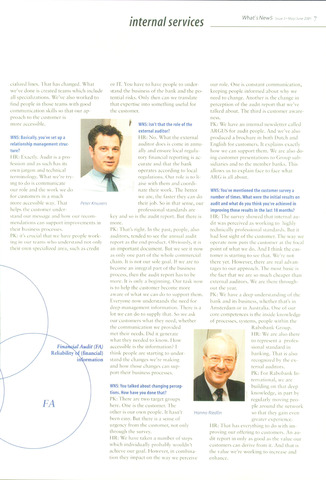internaI services
I
FA
cialized lines. That has changed. What
we've done is created teams which include
all specializations. We've also worked to
find people in those teams with good
communication skiils so that our ap-
proach to the eustomer is
more accessible.
WNS: Basically, you've set up a
relationship management struc-
ture?
HR: Exactly. Audit is a pro-
fession and as such has its
own jargon and technical
terminology. What we're try-
ing to do is communicate
our role and the work we do
for customers in a much
more accessible way. That
helps the eustomer under-
stand our message and how our recom-
mendations can support improvements in
their business processes.
PK: it's crucial that we have people work-
ing in our teams who understand not only
their own specialized area, such as credit
FinakcMl Audit (FA)
Reliability of (financial)
information
or IT. You have to have people to under
stand the business of the bank and the po-
tential risks. Only then can we translate
that expertise into something useful for
the eustomer.
WNS: Isn't that the role of the
external auditor?
HR: No. What the external
auditor does is come in annu-
ally and ensure local regula-
tory financial reporting is ac
curate and that the bank
operates according to local
regulations. Our role is to li-
aise with them and coordi-
nate their work. The better
we are, the faster they can do
their job. So in that sense, our
professional standards are
key and so is the audit report. But there is
more.
PK: That's right. In the past, people, also
auditors, tended to see the annual audit
report as the end product. Obviously, it is
an important document. But we see it now
as only one part of the whole commercial
chain. It is not our sole goal. If we are to
become an integral part of the business
process, then the audit report has to be
more. It is only a beginning. Our task now
is to help the eustomer become more
aware of what we can do to support them.
Everyone now understands the need for
deep management information. There is a
lot we can do to supply that. So we ask
our customers what they need, whether
the communication we provided
met their needs. Did it generate
what they needed to know. How
accessible is the information? I
think people are starting to under
stand the changes we're making
and how those changes can sup
port their business processes.
WNS: You talked about changing percep-
tions. How have you done that?
PK: There are two target groups
here. One is the eustomer. The
other is our own people. It hasn't
been easy. But there is a sense of
urgency from the eustomer, not only
through the survey.
HR: We have taken a number of steps
which individually probably wouldn't
achieve our goal. However, in combina-
tion they impact on the way we perceive
our role. One is constant communication,
keeping people informed about why we
need to change. Another is the change in
perception of the audit report that we've
talked about. The third is eustomer aware-
ness.
PK: We have an internal newsletter called
ARGUS for audit people. And we've also
produced a brochure in both Dutch and
English for customers. It explains exactly
how we can support them. We are also do-
ing eustomer presentations to Group sub-
sidiaries and to the member banks. This
allows us to explain face to face what
ARG is all about.
WNS: You've mentioned the eustomer survey a
number of times. What were the initial results on
audit and what do you think you've achieved in
improving those results in the last 18 months?
I IR: The survey showed that internal au
dit was perceived as working to highly
technically professional standards. But it
had lost sight of the eustomer. The way we
operate now puts the eustomer at the focal
point of what we do. And I think the eus
tomer is starting to see that. We're not
there yet. However, there are real advan-
tages to our approach. The most basic is
the fact that we are so much cheaper than
external auditors. We are there through-
out the year.
PK: We have a deep understanding of the
bank and its business, whether that's in
Amsterdam or in Australia. One of our
core competences is the inside knowledge
of processes, systems, people within the
Rabobank Group.
HR: We are also there
to represent a profes
sional Standard in
banking. That is also
recognized by the ex
ternal auditors.
PK: For Rabobank In
ternational, we are
building on that deep
knowledge, in part by
regularly moving peo
ple around the network
so that they gain even
greater experience.
HR: That has everything to do with im
proving our offering to customers. An au
dit report in only as good as the value our
customers can derive from it. And that is
the value we're working to increase and
enhance.
Peter Knuvers
fca
Hanno Riedlin

